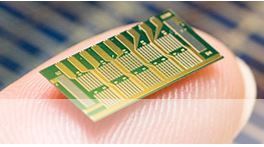Future Birth Control Options May Include Implantable And Programmable 'Contraceptive-In-A-Chip'

The Jetsons of cartoon fame drove through space in a small family-sized vehicle, which neatly folded into the size of a briefcase. To make dinner, Jane Jetson pressed buttons on a computer and out popped a ready-made meal. Budding feminists of the 1960s, though, really had only one question on their minds: What kind of birth control did Jane and George Jetson use to maintain their small, two child family size? Probably the kind newly proposed by MicroCHIPS of Lexington, Mass.
The company has re-imagined birth control as a chip implanted under a woman’s skin. Using a local anaesthetic, the device could be inserted in a short procedure taking no more than 30 minutes. From there, the chip would not only be capable of delivering a daily dose of 30 milligrams of levonorgestrel, a common contraceptive drug, throughout a period lasting as long as 16 years, but also it could be turned on and off by remote control as the need arises. As designed, the chip is just 20 x 20 x 7 millimeters — not even the size of your fingertip — yet it contains a reservoir array, which contains and protects the hormone until an electric current from a small internal battery signals the release of a single dose. The chip uses the same frequency that all medical electronics use for communication.
Implantable contraceptive chips are not the only products MicroCHIPS has under development. The company has already successfully tested a similar chip for delivering osteoporosis medication to post-menopausal women over a one-month period. According to the company, the concept has been proven to work, even though a few logistics need to be worked out — such as how to keep the wireless data secure.
Weird and scary though this new birth control may seem, implantable medical devices already exist in the form of pacemakers and pain pumps. This is simply the next generation of devices and one that has been developed by scientists at Massachusetts Institute of Technology.
In 2012, Robert Farra, president of MicroChips, said he expected the company would need two more years to develop a chip with enough reservoirs to effectively offer consistent small doses of medicine. After that, a series of clinical trials will need to be conducted in order to show the device is both safe and effective. Even if all goes as planned, then, sounds like your new remote-controlled contraceptive device would not be available for use until 2016, earliest. Still, a girl can dream.



























